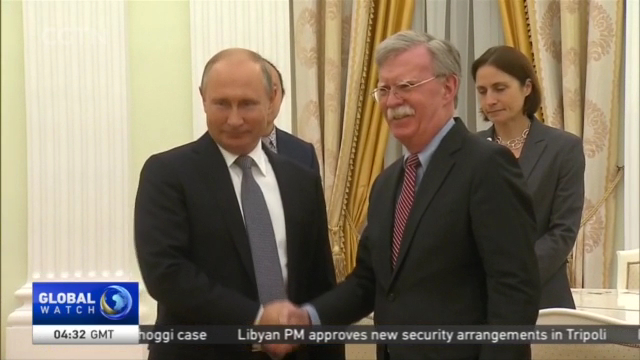
13:38, 24-Oct-2018
US-Russia Nuclear Treaty: US national security adviser wraps up two days of talks in Moscow
Updated
13:25, 27-Oct-2018
02:30

Meanwhile, US National Security Adviser John Bolton says Washington could trigger its official withdrawal from a nuclear weapons agreement with Moscow as early as December. That means, following the mandatory six-month withdrawal period, Russia could be free to produce as many intermediate-range nuclear weapons as it likes by next summer. Our correspondent Julia Chapman reports from the Russian capital.
It was a day of delicate diplomacy in Moscow. Donald Trump's national security adviser holding meeting after meeting with Russia's most powerful. John Bolton arrived in Moscow as the U.S. announced plans to withdraw from a historic nuclear treaty. President Vladimir Putin was left wondering where the olive branch was.
VLADIMIR PUTIN RUSSIAN PRESIDENT "As far as I remember, the coat of arms of the United States depicts a bald eagle. In one talon it holds 13 arrows and in the other - an olive branch as a sign of a peaceful policy with 13 olives on it. The question is has your eagle already picked all the olives, so only arrows are left."
Joking aside, Putin called the U.S. withdrawal from the Intermediate-Range Nuclear Forces Treaty "unfriendly" and accusations of Russian violations "unsubstantiated". John Bolton himself is said to be the driving force behind the move.
JOHN BOLTON US NATIONAL SECURITY ADVISER "It's important first to look at the reality that the treaty was outmoded, being violated, and being ignored by other countries. So under that view, exactly one country was constrained by the INF treaty -- The United States."
JULIA CHAPMAN MOSCOW "John Bolton bringing a close to his two-day visit to Moscow, pouring cold water on suggestions that the INF treaty could be renegotiated. But he also firmly rejected the idea that the U.S. withdrawal makes the world a more dangerous place."
Bolton called the INF landmark agreement "a Cold War bilateral ballistic-missile-related treaty in a multipolar ballistic-missile world". Russian officials and experts have been expressing nearly unanimous support for it.
EVGENY BUZHINSKY MILITARY EXPERT "The INF treaty is one of the fundamental elements of strategic stability in the world. The concept of strategic stability will now be significantly devalued and the system of arms control is simply crumbling."
The visit did produce confirmation that Presidents Putin and Trump will meet again in November. Although the INF treaty seems to be irredeemable, the conversation between the U.S. and Russia continues. Julia Chapman, CGTN, Moscow.

SITEMAP
Copyright © 2018 CGTN. Beijing ICP prepared NO.16065310-3
Copyright © 2018 CGTN. Beijing ICP prepared NO.16065310-3